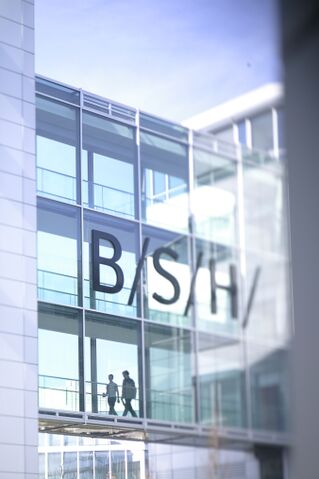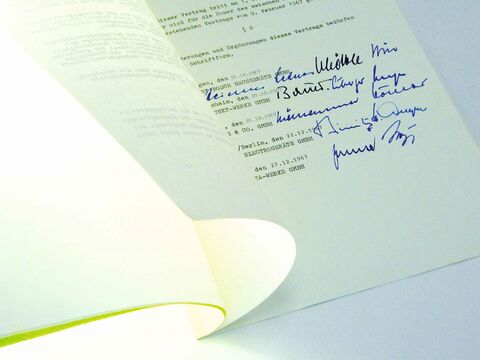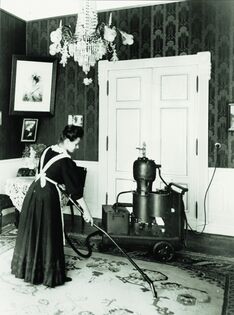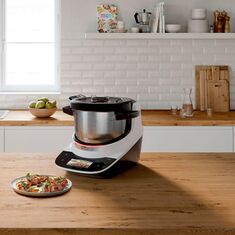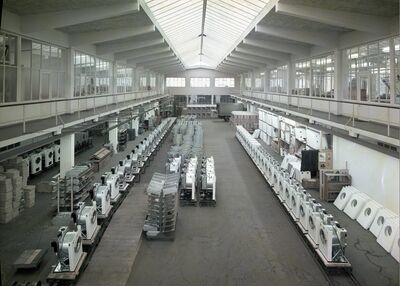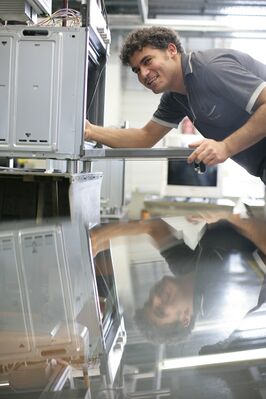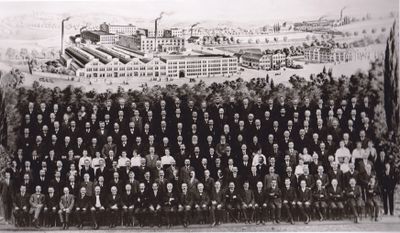Main Page: Difference between revisions
No edit summary Tags: Manual revert Visual edit |
|||
| (24 intermediate revisions by 2 users not shown) | |||
| Line 1: | Line 1: | ||
[[File:BSH Zentrale Muenchen MCZK002102 architecture4 def Grenzner.jpg|alt=Picture of the BSH headquarters in the BSH wiki|thumb| | [[File:BSH Zentrale Muenchen MCZK002102 architecture4 def Grenzner.jpg|alt=Picture of the BSH headquarters in the BSH wiki|thumb|480x480px|BSH headquarters in Munich's Carl-Wery-Strasse 34. (Source:Press fotos BSH Hausgeräte GmbH)]] | ||
''' | '''Welcome to the BSH Wiki, the information pool on the history of BSH!''' | ||
The database contains texts on [[Special:MyLanguage/Milestones of Success|milestones]] in the company’s history and in product development. The history of BSH is brought to life through historical pictures and exciting facts. This wiki was created in close association with the BSH Group Archive. | |||
You will find the key facts and figures on how the company BSH Hausgeräte GmbH evolved from Bosch und Siemens Hausgeräte GmbH to become one of the world’s leading home appliance manufacturers. | |||
Read and discover the history and stories of BSH from the [[Special:MyLanguage/Dedusting pumps – the first mobile vacuum cleaners|dust suction pump]] to the [[Special:MyLanguage/Home Connect|Home Connect App]]. | |||
== '''The BSH since 1967''' == | |||
==== A short History of the BSH ==== | |||
[[File:1967 Vertrag BSH midi.jpg|thumb|right|480px|The founding contract of BSH, 1967.]] | |||
The home appliance market was in crisis in the mid-1960s. To improve their competitiveness in this sector and overcome the challenges of the European market, [[Special:MyLanguage/Robert Bosch GmbH| Robert Bosch GmbH]] and [[Special:MyLanguage/Siemens|Siemens AG]] sealed their collaboration officially on January 13, 1967 to form Bosch and Siemens Hausgeräte GmbH (BSHG). The success of the joint undertaking bolstered confidence. The parent companies Bosch and Siemens began to take steps in 1972 to make BSHG an independent company. The move was completed by 1978. The opening of the central BSHG administration building in [[Special:MyLanguage/The Company Headquarters in Munich|Munich Hochstraße]] represented a clearly visible sign of the merger. | |||
The consolidation of the previous years came just in the nick of time. The German economy and home appliance business was stagnant at the beginning of the 1980s. Despite this, BSHG not only managed to hold its own on the market, it even increased its market share still further. The situation was boosted by the sensational insolvency of the company’s largest competitor and sector leader AEG. BSHG expanded its portfolio with the addition of the well-known [[Special:MyLanguage/The Neff Brand and the BSH Site in Bretten|NEFF brand]], a former subsidiary of AEG. | |||
The strong position on the domestic market allowed BSHG to press ahead with its goal of developing systematically into a global company. Sales subsidiaries were established and factories built in countries with growing home appliance markets. Strong regional brands were affiliated with BSHG through joint ventures or acquired. In addition to the European expansion, the company entered the [[Special:MyLanguage/The Americas Region|American]] and [[Special:MyLanguage/The Asia Region|Asian market]] in 1994. BSHG expanded its portfolio in Germany with the addition of tradition-steeped home appliance manufacturer [[Special:MyLanguage/Gaggenau|Gaggenau]] based in Baden. | |||
At the turn of the new millennium, BSHG, now called BSH, embarked on a course of modernization. The corporate mission was revised, while business conduct guidelines and diversity management were introduced. Despite tension in the world economy, BSH was able to expand internationally and develop new forward-looking markets. Attention focused especially on growing business abroad in Eastern Europe and North America. BSH also began stepping up its involvement in the Arab world in 2010, thus developing a strong international network over the years that guaranteed financial security and economic success. | |||
With the slogan BSH/NextLevel, BSH embarked on a course of strategic realignment, one of the main objectives of which was to focus consistently on the consumer. Greater attention was to be paid in future to the different needs of consumers regionally in terms of development, sales and service. At the same time, efforts would also focus on promoting the digital transition. Digitalization meanwhile was playing an increasingly significant role for purchasing, usage and service. | |||
==== The chronology of BSH ==== | |||
*[[BSH Chronology 1967-1978: Establishment and National Consolidation|1967-1978: Establishment and National Consolidation]] | |||
*[[BSH Chronology 1979-1983: National Growth|1979-1983: National Growth]] | |||
*[[BSH Chronology 1984-2002: Sustainability and Internationalization|1984-2002: Sustainability and Internationalization]] | |||
*[[BSH Chronology 2003-2013: International Consolidation|2003-2013: International Consolidation]] | |||
*[[BSH Chronology 2014-today: Setting a new course|2014-today: Setting a new course]] | |||
== ''' BSH brands and products''' == | |||
[[File:Foto 01 01 1906 Entstaeubungspumpe.jpg|thumb|315x315px|From the dedusting pump... ]] | |||
[[File:2019 Milestone Cookit.jpg|thumb|235x235px|...to the CookIt multifunctional kitchen machine. BSH combines over 100 years of household appliance know-how.]] | |||
==== History of the BSH brands and products ==== | |||
The BSH brands convey passion and are among the strongest on the home appliance market. The core brands [[Special:MyLanguage/Robert Bosch GmbH|Bosch]] and [[Special:MyLanguage/Siemens|Siemens]] have been there right from the start in 1967. [[Special:MyLanguage/The Neff Brand and the BSH Site in Bretten|Neff]] became part of BSH in 1982, while [[Special:MyLanguage/Gaggenau|Gaggenau]] was added to the portfolio in 1995. Backed by a long history in their own regions, [[Special:MyLanguage/Local Heroes|Local Heroes]] such as [[Special:MyLanguage/Balay|Balay]] in Spain (1988), [[Special:MyLanguage/The Americas Region|Thermador]] in the USA (1998), but also [[Special:MyLanguage/History of the Constructa brand|Constructa]], known for [[Special:MyLanguage/The Constructa fully automatic washing machine|the first fully automatic washing machine]] in Germany, now additionally benefit from the expertise of the BSH technology centers. The brand portfolio allows BSH to offer a wide range of products for a variety of different customers and needs. | |||
The [[Special:MyLanguage/Milestones of Success|BSH products]] offer reliability and outstanding quality. They are developed and produced on the basis of technological expertise and in-depth knowledge of customer needs. In this respect, BSH follows the tradition of its parent companies Bosch and Siemens: The [[Special:MyLanguage/The first Bosch refrigerator – a round affair|first Bosch refrigerator]] conquered the market in 1933, while the Siemens [[Special:MyLanguage/Dedusting pumps – the first mobile vacuum cleaners|dust suction pump]] has been freeing the atmosphere of dust since 1906. Constructa, Neff and Gaggenau also contribute their expert knowledge and products to BSH and are continuing to develop them further. An example of this is downdraft ventilation from Gaggenau. | |||
==== Innovations and Milestones in product development ==== | |||
The history of BSH is a history of [[Special:MyLanguage/Continuous improvement mindset|inventions, innovations and progressive developments]]. The company has always aspired to exceed expectations and be the best. The corporate culture this engenders is continuously developed and optimized in the products and processes. For example, the product [[Special:MyLanguage/AquaStop – reliable protection against water damage|AquaStop]] has been guaranteeing reliable protection against water damage since 1985, while [[Special:MyLanguage/Zeolite drying|Zeolite drying]] technology allowed the then most energy-efficient dishwasher in the world to be manufactured in 2008. Some BSH products in recent decades were even [[Special:MyLanguage/Ahead of its time|ahead of their time]]. | |||
From the Siemens dust suction pump from 1906 and the Bosch Neuzeit I food processor from 1952, to the full-surface induction cooktop from 2011, the products from BSH make life easier for people. An impressive [[Special:MyLanguage/Milestones of Success|range of technically innovative products]] has emerged over a period of more than 100 years. | |||
=== | ==== Global Brands ==== | ||
== | |||
*[[Special:MyLanguage/Robert Bosch GmbH|Bosch]] | |||
*[[Special:MyLanguage/Siemens|Siemens]] | |||
*[[Special:MyLanguage/Gaggenau|Gaggenau]] | |||
*[[Special:MyLanguage/The Neff Brand and the BSH Site in Bretten|NEFF]] | |||
==== Local Brands ==== | |||
*[[Special:MyLanguage/The Americas Region#Thermador|Thermador]] | |||
*[[Special:MyLanguage/Balay|Balay]] | |||
*[[Special:MyLanguage/The Americas Region#Der Cono Sur rückt in den Fokus|Coldex]] | |||
*[[Special:MyLanguage/History of the Constructa brand|Constructa]] | |||
*[[Special:MyLanguage/Region_Europe#Greece|Pitsos]] | |||
*[[Special:MyLanguage/Region_Europe#Turkey|Profilo]] | |||
*Junker | |||
==== | == '''BSH-sites und employees''' == | ||
==== The sites and how they have developed ==== | ==== The sites and how they have developed ==== | ||
[[File:Foto 02 1956 ca Constructa Werkhalle.jpg|thumb|400x400px|A view into an early Constructa factory hall, 1956.]] | |||
[[File:Fertigung in Traunreut 1 Qualitaetskontrolle 2007 BSH-Pressebilder.jpg|thumb|400x400px|Production and quality control at the Traunreut plant, 2007.]] | |||
[[File:1900 ca Belegschaft der Eisenwerke Gaggenau BSH Konzernarchiv.jpg|thumb|400x400px|The employees of the Gaggenau ironworks, around 1900.]] | |||
BSH is represented today on all continents of the world. But the history of BSH begins in Germany. Today, in addition to the modern company headquarters in Munich, the company’s oldest sites, and the richest in tradition, are also found in Germany. | |||
BSH has always regarded itself not only as a German but also a [[Special:MyLanguage/Region Europe|European company]]. As the leading home appliance manufacturer, most of the production locations and sales organizations today are located in Europe. The [[Special:MyLanguage/Netherlands|Netherlands]] is home to the oldest representative offices of the parent companies of BSH, Bosch and Siemens outside of Germany. Siemens & Halske products were represented in The Hague by the company Wisse, Piccaluga & Co. as far back as 1879. The company Willem van Rijn then took over as sole representative of Bosch products in the Netherlands in 1903. Soon after it was established, BSH began to position itself on the European market. BSH’s European expansion began in Greece and Slovenia in the 1970s. BSH continued to expand its presence in Europe in the 1980s, acquiring a majority share in the Spanish home appliance manufacturer [[Special:MyLanguage/Balay|Balay]]-Safel. In 1998, BSH also acquired the remaining shares in Balay, which by then also included the Safel brand, thus making the company a wholly-owned subsidiary of BSH. Another [[Special:MyLanguage/Local Heroes|Local Hero]] of BSH. Home appliances from BSH have been available in Poland since 1990. A plant for assembling washing machines was opened close to the Polish city of Łódź in 1994. It was the first new plant to be built by BSH in Eastern Europe, The washing machines from Łódź were initially intended exclusively for the Eastern European markets but were also produced for EU countries from 1999. Today, alongside the assembly plant for front-loader washing machines, Łódź is also home to a logistics center, a dishwasher plant, a plant for washer-dryers, the new and the new development center for dryers, and the Regional Contact Center (RCC). | |||
BSH was also active in the [[Special:MyLanguage/The Americas Region|America region]] in the 1990s. Apart from the existing sales companies servicing their core markets, BSH was also expanding into North America with the construction of a factory for dishwashers in New Bern and the acquisition of the US home appliance manufacturer Thermador. The development of the South American market began with the takeover of the leading Brazilian home appliance manufacturer Continental in 2001. BSH used the infrastructure acquired in the process to also distribute its Bosch and Siemens brands. The Peruvian cooling appliances manufacturer Coldex was acquired in 1996 to broaden the company’s base on the South American growth market. | |||
BSH viewed the Asian home appliance market as offering enormous growth potential. At the same time, the [[Special:MyLanguage/The Asia Region|Asia and Oceania region]] had an extremely differentiated market structure. Apart from the heavily urbanized population centers, there were rural areas with a poorly developed infrastructure. Following successful entry into the Chinese market in November 1994, the company began to expand its market presence in the [[Special:MyLanguage/The Australia/Oceania Region|Pacific region]]. Sites, subsidiaries, representative offices and sales companies followed in Australia, India, Indonesia, Malaysia, New Zealand, Singapore, Taiwan and Thailand. | |||
BSH is also represented in [[Special:MyLanguage/The Region Africa|Africa]] and the Middle East. It has subsidiaries in Morocco, South Africa, Israel and the United Arab Emirates, which are responsible for the local sales organizations. | |||
===== BSH | ===== BSH Germany ===== | ||
* [[Special:MyLanguage/Bad Neustadt|Bad Neustadt]] | |||
* [[Special:MyLanguage/The Berlin Site|Berlin]] | |||
* [[Special:MyLanguage/The Neff Brand and the BSH Site in Bretten|Bretten]] | |||
* [[Special:MyLanguage/Factory and Technology Center in Dillingen|Dillingen]] | |||
* [[Special:MyLanguage/The Giengen Factory|Giengen]] | |||
* [[Special:MyLanguage/The Company Headquarters in Munich|Munich]] | |||
* [[Special:MyLanguage/The Nauen Factory|Nauen]] | |||
* [[Special:MyLanguage/BSH Regensburg – Electronic Systems, Drives (PED)|Regensburg research and development site]] | |||
* [[Special:MyLanguage/The Traunreut Factory|Traunreut]] | |||
===== BSH Global ===== | |||
*[[Special:MyLanguage/Region Europe|The Region Europe]] | |||
*[[Special:MyLanguage/The Americas Region|The Americas Region]] | |||
*[[Special:MyLanguage/The Asia Region|The Asia Region]] | |||
*[[Special:MyLanguage/The Region Africa|The Region Africa]] | |||
*[[Special:MyLanguage/The Australia/Oceania Region|The Australia/Oceania Region]] | |||
==== People at BSH ==== | ==== People at BSH ==== | ||
BSH employees are committed, professional and globally networked. They are the secret ingredient that drives the success of the company. Mutual respect, trusting collaboration and open dialog – these values not only characterize the corporate culture of BSH but are also firmly entrenched in its Corporate Principles. Other important factors include topics such as occupational safety, health management, diversity and work-life balance. When all of these values are taken to heart and lived out, BSH can produce key innovations and ensure its sustainable success. | BSH employees are committed, professional and globally networked. They are the secret ingredient that drives the success of the company. Mutual respect, trusting collaboration and open dialog – these values not only characterize the corporate culture of BSH but are also firmly entrenched in its Corporate Principles. Other important factors include topics such as occupational safety, health management, diversity and work-life balance. When all of these values are taken to heart and lived out, BSH can produce key innovations and ensure its sustainable success. | ||
* [[BSH Academy]] | * [[Special:MyLanguage/BSH Academy|BSH Academy]] | ||
* [[BSH training & education|Training at BSH]] | * [[Special:MyLanguage/BSH training & education|Training at BSH]] | ||
* [[The employee magazines|Employee magazines]] | * [[Special:MyLanguage/The employee magazines|Employee magazines]] | ||
* [[The BSH football tournament]] | * [[Special:MyLanguage/The BSH football tournament|The BSH football tournament]] | ||
== '''Pictures from BSH history''' == | |||
In this section, aspects of BSH history are presented in picture series. | |||
*[[Special:MyLanguage/Bosch_Roadshow|The Bosch Roadshow]] | |||
*[[Special:MyLanguage/Constructa picture gallery|Constructa - a washing machine legend]] | |||
*[[Special:MyLanguage/Giengen picture gallery|The Giengen plant in the 1950s]] | |||
*[[Special:MyLanguage/Milestones of Success|Milestones of Success]] | |||
<br><br> | <br> | ||
<br> | |||
<br> | |||
[[Special:MyLanguage/Special:AllPages|Are you looking for something specific? Here you will find all the pages.]] | |||
[https://wiki.bsh-group.com/de/wiki/Hauptseite Discover the BSH wiki in German / Möchten Sie im deutschsprachigen BSH-Wiki lesen, klicken Sie hier] | [https://wiki.bsh-group.com/de/wiki/Hauptseite Discover the BSH wiki in German / Möchten Sie im deutschsprachigen BSH-Wiki lesen, klicken Sie hier] | ||
Latest revision as of 11:23, 24 May 2023
Welcome to the BSH Wiki, the information pool on the history of BSH!
The database contains texts on milestones in the company’s history and in product development. The history of BSH is brought to life through historical pictures and exciting facts. This wiki was created in close association with the BSH Group Archive.
You will find the key facts and figures on how the company BSH Hausgeräte GmbH evolved from Bosch und Siemens Hausgeräte GmbH to become one of the world’s leading home appliance manufacturers.
Read and discover the history and stories of BSH from the dust suction pump to the Home Connect App.
The BSH since 1967
A short History of the BSH
The home appliance market was in crisis in the mid-1960s. To improve their competitiveness in this sector and overcome the challenges of the European market, Robert Bosch GmbH and Siemens AG sealed their collaboration officially on January 13, 1967 to form Bosch and Siemens Hausgeräte GmbH (BSHG). The success of the joint undertaking bolstered confidence. The parent companies Bosch and Siemens began to take steps in 1972 to make BSHG an independent company. The move was completed by 1978. The opening of the central BSHG administration building in Munich Hochstraße represented a clearly visible sign of the merger.
The consolidation of the previous years came just in the nick of time. The German economy and home appliance business was stagnant at the beginning of the 1980s. Despite this, BSHG not only managed to hold its own on the market, it even increased its market share still further. The situation was boosted by the sensational insolvency of the company’s largest competitor and sector leader AEG. BSHG expanded its portfolio with the addition of the well-known NEFF brand, a former subsidiary of AEG.
The strong position on the domestic market allowed BSHG to press ahead with its goal of developing systematically into a global company. Sales subsidiaries were established and factories built in countries with growing home appliance markets. Strong regional brands were affiliated with BSHG through joint ventures or acquired. In addition to the European expansion, the company entered the American and Asian market in 1994. BSHG expanded its portfolio in Germany with the addition of tradition-steeped home appliance manufacturer Gaggenau based in Baden.
At the turn of the new millennium, BSHG, now called BSH, embarked on a course of modernization. The corporate mission was revised, while business conduct guidelines and diversity management were introduced. Despite tension in the world economy, BSH was able to expand internationally and develop new forward-looking markets. Attention focused especially on growing business abroad in Eastern Europe and North America. BSH also began stepping up its involvement in the Arab world in 2010, thus developing a strong international network over the years that guaranteed financial security and economic success.
With the slogan BSH/NextLevel, BSH embarked on a course of strategic realignment, one of the main objectives of which was to focus consistently on the consumer. Greater attention was to be paid in future to the different needs of consumers regionally in terms of development, sales and service. At the same time, efforts would also focus on promoting the digital transition. Digitalization meanwhile was playing an increasingly significant role for purchasing, usage and service.
The chronology of BSH
- 1967-1978: Establishment and National Consolidation
- 1979-1983: National Growth
- 1984-2002: Sustainability and Internationalization
- 2003-2013: International Consolidation
- 2014-today: Setting a new course
BSH brands and products
History of the BSH brands and products
The BSH brands convey passion and are among the strongest on the home appliance market. The core brands Bosch and Siemens have been there right from the start in 1967. Neff became part of BSH in 1982, while Gaggenau was added to the portfolio in 1995. Backed by a long history in their own regions, Local Heroes such as Balay in Spain (1988), Thermador in the USA (1998), but also Constructa, known for the first fully automatic washing machine in Germany, now additionally benefit from the expertise of the BSH technology centers. The brand portfolio allows BSH to offer a wide range of products for a variety of different customers and needs.
The BSH products offer reliability and outstanding quality. They are developed and produced on the basis of technological expertise and in-depth knowledge of customer needs. In this respect, BSH follows the tradition of its parent companies Bosch and Siemens: The first Bosch refrigerator conquered the market in 1933, while the Siemens dust suction pump has been freeing the atmosphere of dust since 1906. Constructa, Neff and Gaggenau also contribute their expert knowledge and products to BSH and are continuing to develop them further. An example of this is downdraft ventilation from Gaggenau.
Innovations and Milestones in product development
The history of BSH is a history of inventions, innovations and progressive developments. The company has always aspired to exceed expectations and be the best. The corporate culture this engenders is continuously developed and optimized in the products and processes. For example, the product AquaStop has been guaranteeing reliable protection against water damage since 1985, while Zeolite drying technology allowed the then most energy-efficient dishwasher in the world to be manufactured in 2008. Some BSH products in recent decades were even ahead of their time.
From the Siemens dust suction pump from 1906 and the Bosch Neuzeit I food processor from 1952, to the full-surface induction cooktop from 2011, the products from BSH make life easier for people. An impressive range of technically innovative products has emerged over a period of more than 100 years.
Global Brands
Local Brands
BSH-sites und employees
The sites and how they have developed
BSH is represented today on all continents of the world. But the history of BSH begins in Germany. Today, in addition to the modern company headquarters in Munich, the company’s oldest sites, and the richest in tradition, are also found in Germany.
BSH has always regarded itself not only as a German but also a European company. As the leading home appliance manufacturer, most of the production locations and sales organizations today are located in Europe. The Netherlands is home to the oldest representative offices of the parent companies of BSH, Bosch and Siemens outside of Germany. Siemens & Halske products were represented in The Hague by the company Wisse, Piccaluga & Co. as far back as 1879. The company Willem van Rijn then took over as sole representative of Bosch products in the Netherlands in 1903. Soon after it was established, BSH began to position itself on the European market. BSH’s European expansion began in Greece and Slovenia in the 1970s. BSH continued to expand its presence in Europe in the 1980s, acquiring a majority share in the Spanish home appliance manufacturer Balay-Safel. In 1998, BSH also acquired the remaining shares in Balay, which by then also included the Safel brand, thus making the company a wholly-owned subsidiary of BSH. Another Local Hero of BSH. Home appliances from BSH have been available in Poland since 1990. A plant for assembling washing machines was opened close to the Polish city of Łódź in 1994. It was the first new plant to be built by BSH in Eastern Europe, The washing machines from Łódź were initially intended exclusively for the Eastern European markets but were also produced for EU countries from 1999. Today, alongside the assembly plant for front-loader washing machines, Łódź is also home to a logistics center, a dishwasher plant, a plant for washer-dryers, the new and the new development center for dryers, and the Regional Contact Center (RCC).
BSH was also active in the America region in the 1990s. Apart from the existing sales companies servicing their core markets, BSH was also expanding into North America with the construction of a factory for dishwashers in New Bern and the acquisition of the US home appliance manufacturer Thermador. The development of the South American market began with the takeover of the leading Brazilian home appliance manufacturer Continental in 2001. BSH used the infrastructure acquired in the process to also distribute its Bosch and Siemens brands. The Peruvian cooling appliances manufacturer Coldex was acquired in 1996 to broaden the company’s base on the South American growth market.
BSH viewed the Asian home appliance market as offering enormous growth potential. At the same time, the Asia and Oceania region had an extremely differentiated market structure. Apart from the heavily urbanized population centers, there were rural areas with a poorly developed infrastructure. Following successful entry into the Chinese market in November 1994, the company began to expand its market presence in the Pacific region. Sites, subsidiaries, representative offices and sales companies followed in Australia, India, Indonesia, Malaysia, New Zealand, Singapore, Taiwan and Thailand.
BSH is also represented in Africa and the Middle East. It has subsidiaries in Morocco, South Africa, Israel and the United Arab Emirates, which are responsible for the local sales organizations.
BSH Germany
- Bad Neustadt
- Berlin
- Bretten
- Dillingen
- Giengen
- Munich
- Nauen
- Regensburg research and development site
- Traunreut
BSH Global
- The Region Europe
- The Americas Region
- The Asia Region
- The Region Africa
- The Australia/Oceania Region
People at BSH
BSH employees are committed, professional and globally networked. They are the secret ingredient that drives the success of the company. Mutual respect, trusting collaboration and open dialog – these values not only characterize the corporate culture of BSH but are also firmly entrenched in its Corporate Principles. Other important factors include topics such as occupational safety, health management, diversity and work-life balance. When all of these values are taken to heart and lived out, BSH can produce key innovations and ensure its sustainable success.
Pictures from BSH history
In this section, aspects of BSH history are presented in picture series.
- The Bosch Roadshow
- Constructa - a washing machine legend
- The Giengen plant in the 1950s
- Milestones of Success
Are you looking for something specific? Here you will find all the pages.
Discover the BSH wiki in German / Möchten Sie im deutschsprachigen BSH-Wiki lesen, klicken Sie hier
